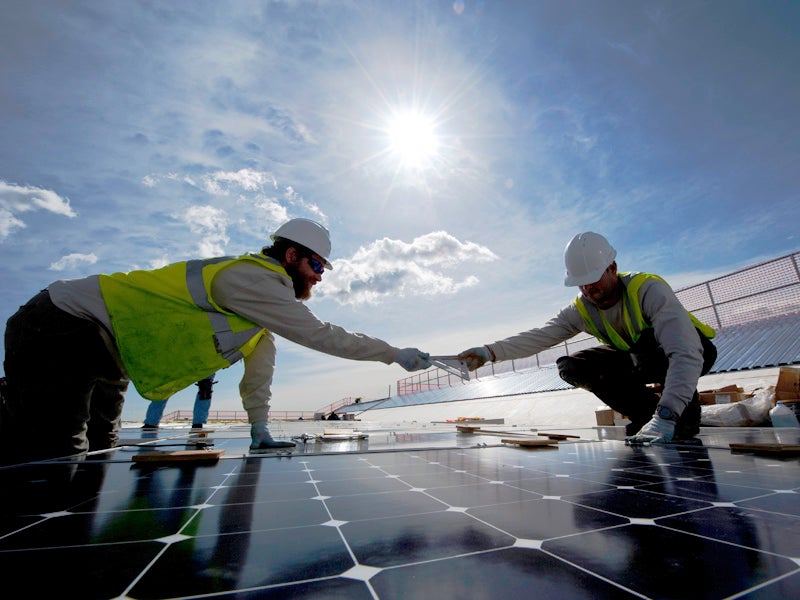The Fate of the Planet Rests in Our Hands, not Trump's
Trump’s withdrawal from the Paris climate agreement won’t take effect until 2020 and won’t stop the global transition to clean energy.

This page was published 8 years ago. Find the latest on Earthjustice’s work.
President Trump’s decision to exit the Paris Agreement will forfeit U.S. government leadership on climate change, but his move will not stop the global transition to clean energy that is already underway.
The fate of the planet does not rest in one man’s hands, nor in his vague talk of negotiating a new deal. Excluding Syria and Nicaragua, every other nation in the world has already committed—through the existing Paris deal—to accelerating the move away from fossil fuels. Many U.S. states have adopted aggressive climate goals. With the falling price of renewable energy, the private sector is seizing the opportunity to build out new energy infrastructure.
“Progress will continue. The American people will not turn our back on climate leadership.”
As an environmental law organization, Earthjustice will support these positive trends by pulling on the levers of law and policy in favor of the fuels of the future and the safety of our collective home.
“Earthjustice will continue to do everything in our power to accelerate the clean energy transition in the United States and globally. We are already working in states around the country,” said Earthjustice President Trip Van Noppen. “Trump’s action won’t reverse the momentum. Progress will continue. The American people will not turn our back on climate leadership. The consequences are simply too dire.”
The Paris Agreement will endure
Trump’s decision will not take legal effect immediately. Under the Paris deal’s provisions, signatory nations must wait at least three years after entering the agreement to withdraw, and even then it takes a year for the withdrawal to go into effect. That means the U.S. exit won’t take effect legally until November 4, 2020, one day after the next presidential election.
There is extraordinary global political will behind the Paris Agreement, which no single nation can undermine. Even without the U.S., the Paris Agreement will continue to bring together 196 other countries around the commitment to hold global temperature rise to “well below 2 degrees Celsius above pre-industrial levels.”
There is extraordinary global political will behind the Paris Agreement, which no single nation can undermine.
Other nations’ leaders aren’t wasting time denying climate change; in fact, they are moving forward to reap the economic and health benefits of the clean energy economy.
The European Union, China and Canada have all stated that they will work to pick up the slack left by the United States on clean energy financing and cutting greenhouse gases. And China recently announced plans to invest $360 billion in renewable power sources like solar and wind by 2020. All told, the international energy system represents a $6 trillion global market. In the eyes of these countries, this is a huge investment opportunity.
Americans will move ahead
At home, American cities, states and forward-thinking businesses—recognizing the need for cheaper, cleaner power, faster job growth and clean air—will take the lead in cutting greenhouse gas emissions and investing in renewables.
Leaders outside the White House see the bigger economic and environmental picture. Renewables represent the fastest growing energy sector and will remain so regardless of today’s announcement. That’s because renewable energy costs are down dramatically. Since 2008, costs for rooftop solar are down 54 percent; for wind, 41 percent; and for utility-scale solar, a whopping 64 percent. American investments in renewable energy rose 17 percent to $44 billion from 2014 to 2015.
Nationally, clean energy jobs outnumber fossil fuel jobs by more than 2.5 to 1.
This investment drives job growth; the solar energy industry now employs more than 260,000 Americans and is creating jobs 17 times faster than the rest of the U.S. economy. There are more than 100,000 Americans working in wind power jobs, with “wind turbine technician” being the fastest-growing job category in the U.S. Nationally, clean energy jobs outnumber fossil fuel jobs by more than 2.5 to 1.
Maryland has demonstrated recently how state government can play a leading role, with a ban on fracking and the approval of the nation’s largest offshore wind farm. Legislators also set more ambitious climate goals, adopting greater energy savings targets and raising the percentage of power that utilities must get from clean energy sources.
Earthjustice helped our Maryland partners make the case for state clean energy legislation, represented clients in legal proceedings, and rallied supporters to submit public comments. Similar work is happening across the country. Earthjustice attorneys are not just pushing back in courts but also showing up to influence often-overlooked—but immensely important—public utility commission regulatory proceedings.
Trump has dropped the ball on climate change, but there are many who will carry it forward.